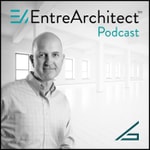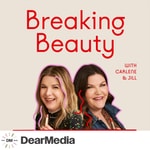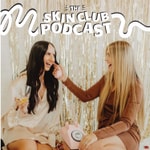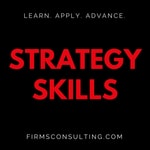Making Sense of Science – Details, episodes & analysis
Podcast details
Technical and general information from the podcast's RSS feed.
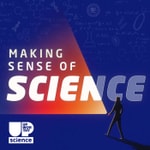

Making Sense of Science features interviews with leading medical and scientific experts about the latest developments in health innovation and the big ethical and social questions they raise. The podcast is hosted by science journalist Matt Fuchs
Recent rankings
Latest chart positions across Apple Podcasts and Spotify rankings.
Apple Podcasts
🇫🇷 France - lifeSciences
23/09/2024#99🇫🇷 France - lifeSciences
22/09/2024#80🇫🇷 France - lifeSciences
21/09/2024#65
Spotify
No recent rankings available
Shared links between episodes and podcasts
Links found in episode descriptions and other podcasts that share them.
See allRSS feed quality and score
Technical evaluation of the podcast's RSS feed quality and structure.
See allScore global : 73%
Publication history
Monthly episode publishing history over the past years.
Therapies for Healthy Aging with Dr. Alexandra Bause
vendredi 14 juin 2024 • Duration 49:24
My guest today is Dr. Alexandra Bause, a biologist who has dedicated her career to advancing health, medicine and healthier human lifespans. Dr. Bause co-founded a company called Apollo Health Ventures in 2017. She is currently a venture partner at Apollo and immersed in the exciting work going on in Apollo’s Venture Lab.
The company is focused on assembling a team of investors to realize important scientific breakthroughs in the life sciences. Dr. Bause and Apollo Health Ventures say that biotech is at “an inflection point” and is set to become a major driver of change and economic value.
Previously, Dr. Bause worked at the Boston Consulting Group in its healthcare practice specializing in biopharma strategy, among other priorities
She did her PhD studies at Harvard Medical School focusing on molecular mechanisms that contribute to cellular aging, and she’s also a trained pharmacist
In the episode, we talk about the present and future of therapeutics that could increase people’s spans of health over the course of their lives, the benefits of certain lifestyle practice for health, the best use of electronic wearables for these purposes, and much more.
Dr. Bause is at the forefront of developing interventions that target the aging process with the aim of ensuring that all of us can have healthier, more productive lifespan.
Show links
Making Sense of Science features interviews with leading medical and scientific experts about the latest developments in health innovation and the big ethical and social questions they raise. The podcast is hosted by science journalist Matt Fuchs
How to Measure Your Stress with Dr. Rosalind Picard
mercredi 21 février 2024 • Duration 34:12
Today’s podcast guest is Rosalind Picard, a researcher, inventor named on over 100 patents, entrepreneur, author, professor and engineer. When it comes to the science related to endowing computer software with emotional intelligence, she wrote the book. It’s published by MIT Press and called Affective Computing.
Dr. Picard is founder and director of the MIT Media Lab’s Affective Computing Research Group. Her research and engineering contributions have been recognized internationally, for example she received the 2022 International Lombardy Prize for Computer Science Research, considered by many to be the Nobel prize in computer science.
Through her research and companies, Dr. Picard has developed wearable sensors, algorithms and systems for sensing, recognizing and responding to information about human emotion. Her products are focused on using fitness trackers to advance clinical quality treatments for a range of conditions.
Meanwhile, in just the past few years, numerous fitness tracking companies have released products with their own stress sensors and systems. You may have heard about Fitbit’s Stress Management Score, or Whoop’s Stress Monitor – these features and apps measure things like your heart rhythm and a certain type of invisible sweat to identify stress. They’re designed to raise your awareness about forms of stress like anxieties and anger, and suggest strategies like meditation to relax in real time when stress occurs.
But how well do these off-the-shelf gadgets work? There’s no one more knowledgeable and experienced than Rosalind Picard to explain the science behind these stress features, what they do exactly, how they might be able to help us, and their current shortcomings.
Dr. Picard is a member of the National Academy of Engineering and a Fellow of the National Academy of Inventors, and a popular speaker who’s given over a hundred invited keynote talks and a TED talk with over 2 million views. She holds a Bachelors in Electrical Engineering from Georgia Tech, and Masters and Doctorate degrees in Electrical Engineering and Computer Science from MIT. She lives in Newton, Massachusetts with her husband, where they’ve raised three sons.
In our conversation, we discuss stress scores on fitness trackers to improve well-being. She carefully describes the difference between commercial products that might help people become more mindful of their health and products that are FDA approved and really capable of advancing the science. We also discuss several fascinating findings and concepts discovered in Dr. Picard’s lab including the multiple arousal theory, a phenomenon you’ll want to hear about. And we talk about the complexity of stress, one reason it’s so tough to measure. For example, many forms of stress are actually good for us. Can fitness trackers tell the difference between stress that’s healthy and unhealthy?
Making Sense of Science features interviews with leading medical and scientific experts about the latest developments in health innovation and the big ethical and social questions they raise. The podcast is hosted by science journalist Matt Fuchs
Meet Dr. Renee Wegrzyn, the First Director of President Biden's New Health Agency, ARPA-H
Season 1 · Episode 55
mercredi 31 mai 2023 • Duration 45:01
In today’s podcast episode, I talk with Renee Wegrzyn, appointed by President Biden as the first director of a federal agency created last year called the Advanced Research Projects Agency for Health, or ARPA-H. It’s inspired by DARPA, the agency that develops innovations for the Defense department and has been credited with hatching world changing technologies such as ARPANET, which became the internet.
Time will tell if ARPA-H will lead to similar achievements in the realm of health. That’s what President Biden and Congress expect in return for funding ARPA-H at 2.5 billion dollars over three years.
How will the agency figure out which projects to take on, especially with so many patient advocates for different diseases demanding moonshot funding for rapid progress.
I talked with Dr. Wegrzyn about the opportunities and challenges, what lessons ARPA-H is borrowing from Operation Warp Speed, how she decided on the first ARPA-H project which was just announced recently, why a separate agency was needed instead of trying to reform HHS and the National Institutes of Health to be better at innovation, and how ARPA-H will make progress on disease prevention in addition to treatments for cancer, Alzheimer’s and diabetes, among many other health priorities.
Dr. Wegrzyn’s resume is filled with experience for her important role. She was a program manager at DARPA where she focused on applying gene editing and synthetic biology to the goal of improving biosecurity. For her work there, she was given the Superior Public Service Medal and, just in case that wasn’t enough ARPA experience, she also worked at another ARPA that leads advanced projects in intelligence, called I-ARPA. Before that, she was in charge of technical teams in the private sector working on gene therapies and disease diagnostics, among other areas. She has been a vice president of business development at Gingko Bioworks and headed innovation at Concentric by Gingko. Her training and education includes a PhD and undergraduate degree in applied biology from the Georgia Institute of Technology and she did her postdoc as an Alexander von Humboldt Fellow in Heidelberg, Germany.
As Dr. Wegrzyn told me, she’s “in the hot seat” - the pressure is on for ARPA-H especially after the need and potential for health innovation was spot lit by the pandemic and the unprecedented speed of vaccine development. We'll soon find out if ARPA-H can produce something in health that’s equivalent to DARPA’s creation of the internet.
Show links:
ARPA-H - https://arpa-h.gov/
Dr. Wegrzyn profile - https://arpa-h.gov/people/renee-wegrzyn/
Dr. Wegrzyn Twitter - https://twitter.com/rwegrzyn?lang=en
President Biden Announces Dr. Wegrzyn's appointment - https://www.whitehouse.gov/briefing-room/statements-releases/2022/09/12/president-biden-announces-intent-to-appoint-dr-renee-wegrzyn-as-inaugural-director-of-advanced-research-projects-agency-for-health-arpa-h/
Leaps.org coverage of ARPA-H - https://leaps.org/arpa/
ARPA-H program for joints to heal themselves - https://arpa-h.gov/news/nitro/ -
ARPA-H virtual talent search - https://arpa-h.gov/news/aco-talent-search/
Making Sense of Science features interviews with leading medical and scientific experts about the latest developments in health innovation and the big ethical and social questions they raise. The podcast is hosted by science journalist Matt Fuchs
Friday Five: New Eye Scans Could Show How Fast You're Aging
Season 1 · Episode 54
vendredi 7 avril 2023 • Duration 09:51
The Friday Five covers five stories in research that you may have missed this week. There are plenty of controversies and troubling ethical issues in science – and we get into many of them in our online magazine – but this news roundup focuses on new scientific theories and progress to give you a therapeutic dose of inspiration headed into the weekend.
Here are the stories covered this week:
- The eyes are the windows to the soul - and biological aging?
- What bean genes mean for health and the planet
- This breathing practice could lower levels of tau proteins
- AI beats humans at assessing heart health
- Should you get a nature prescription?
Making Sense of Science features interviews with leading medical and scientific experts about the latest developments in health innovation and the big ethical and social questions they raise. The podcast is hosted by science journalist Matt Fuchs
Friday Five: Go to This Type of Event to Improve Well-Being, Research Suggests
Season 1 · Episode 53
vendredi 24 mars 2023 • Duration 13:01
The Friday Five covers five stories in research that you may have missed this week. There are plenty of controversies and troubling ethical issues in science – and we get into many of them in our online magazine – but this news roundup focuses on new scientific theories and progress to give you a therapeutic dose of inspiration headed into the weekend.
Go the web page for in this week's Friday Five, here.
This episode includes an interview with Dr. Helen Keyes, Head of the School of Psychology and Sports Science at Anglia Ruskin University.
- Attending sports events is linked to greater life satisfaction
- Identifying specific brain tumors in under 90 seconds with AI
- LSD - minus hallucinations - raises hopes for mental health
- New research on the benefits of cold showers
- Inspire awe in your kids and reap the benefits
Making Sense of Science features interviews with leading medical and scientific experts about the latest developments in health innovation and the big ethical and social questions they raise. The podcast is hosted by science journalist Matt Fuchs
Are You Having a Healthy Change of Heart? An HRV Sensor Can Tell You
mercredi 22 mars 2023 • Duration 19:32
This episode is about a health metric you may not have heard of before: heart rate variability, or HRV. This refers to the small changes in the length of time between each of your heart beats.
Scientists have known about and studied HRV for a long time. In recent years, though, new monitors have come to market that can measure HRV accurately whenever you want.
Five months ago, I got interested in HRV as a more scientific approach to finding the lifestyle changes that work best for me as an individual. It's at the convergence of some important trends in health right now, such as health tech, precision health and the holistic approach in systems biology, which recognizes how interactions among different parts of the body are key to health.
But HRV is just one of many numbers worth paying attention to. For this episode of Making Sense of Science, I spoke with psychologist Dr. Leah Lagos; Dr. Jessilyn Dunn, assistant professor in biomedical engineering at Duke; and Jason Moore, the CEO of Spren and an app called Elite HRV. We talked about what HRV is, research on its benefits, how to measure it, whether it can be used to make improvements in health, and what researchers still need to learn about HRV.
*Talk to your doctor before trying anything discussed in this episode related to HRV and lifestyle changes to raise it.
Show notes
Spren - https://www.spren.com/
Elite HRV - https://elitehrv.com/
Jason Moore Twitter - https://twitter.com/jasonmooreme?lang=en
Dr. Jessilyn Dunn on Twitter - https://twitter.com/drjessilyn?lang=en
Dr. Dunn's study on HRV, flu and common cold - https://jamanetwork.com/journals/jamanetworkopen/fullarticle/2784555
Dr. Leah Lagos - https://drleahlagos.com/
Dr. Lagos on Star Talk - https://www.youtube.com/watch?v=jC2Q10SonV8
Research on HRV and intermittent fasting - https://pubmed.ncbi.nlm.nih.gov/33859841/
Research on HRV and Mediterranean diet - https://medicalxpress.com/news/2010-06-twin-mediterranean-style-diet-heart-function.html#:~:text=Using%20data%20from%20the%20Emory,eating%20a%20Western%2Dtype%20diet
Devices for HRV biofeedback - https://elitehrv.com/heart-variability-monitors-and-elite-hrv-compatible-monitors
Benefits of HRV biofeedback - https://pubmed.ncbi.nlm.nih.gov/32385728/
HRV and cognitive performance - https://www.frontiersin.org/articles/10.3389/fnins.2021.691988/full
HRV and emotional regulation - https://pubmed.ncbi.nlm.nih.gov/36030986/
Fortune article on HRV - https://fortune.com/well/2022/12/26/heart-rate-variability-improving-your-bodys-response-to-stress/
Making Sense of Science features interviews with leading medical and scientific experts about the latest developments in health innovation and the big ethical and social questions they raise. The podcast is hosted by science journalist Matt Fuchs
Friday Five: Money Can Buy You Happiness If You're This Type of Person
Season 1 · Episode 51
vendredi 10 mars 2023 • Duration 17:42
The Friday Five covers five stories in research that you may have missed this week. There are plenty of controversies and troubling ethical issues in science – and we get into many of them in our online magazine – but this news roundup focuses on scientific creativity and progress to give you a therapeutic dose of inspiration headed into the weekend.
Go the web page for in this week's Friday Five, here.
It features interviews with Dr. Christopher Martens, director of the Delaware Center for Cogntiive Aging Research and professor of kinesiology and applied physiology at the University of Delaware, and Dr. Ilona Matysiak, visiting scholar at Iowa State University and associate professor of sociology at Maria Grzegorzewska University.
- Could this supplement help prevent Alzheimer's?
- Why you should care about smart senior towns
- Here's how to reverse being drunk
- Money can make you happy - if you're this type of person
- Personalized anxiety medicine
Making Sense of Science features interviews with leading medical and scientific experts about the latest developments in health innovation and the big ethical and social questions they raise. The podcast is hosted by science journalist Matt Fuchs
Friday Five: Breathe This Way to Increase Well-being, Stanford Study Suggests
Season 1 · Episode 50
vendredi 3 mars 2023 • Duration 11:56
The Friday Five covers five stories in research that you may have missed this week. There are plenty of controversies and troubling ethical issues in science – and we get into many of them in our online magazine – but this news roundup focuses on scientific creativity and progress to give you a therapeutic dose of inspiration headed into the weekend.
Here are the promising studies covered in this week's Friday Five, featuring interviews with Dr. David Spiegel, associate chair of psychiatry and behavioral sciences at Stanford, and Dr. Filip Swirski, professor of medicine and cardiology at the Icahn School of Medicine at Mount Sinai.
- Breathing this way cuts down on anxiety*
- Could your fasting regimen make you sick?
- This type of job makes men more virile
- 3D printed hearts could save your life
- Yet another potential benefit of metformin
* This video with Dr. Andrew Huberman of Stanford shows exactly how to do the breathing practice.
Making Sense of Science features interviews with leading medical and scientific experts about the latest developments in health innovation and the big ethical and social questions they raise. The podcast is hosted by science journalist Matt Fuchs
What Causes Aging - and What Could Reverse It - with Dr. David Sinclair
Season 1 · Episode 49
mardi 28 février 2023 • Duration 11:56
What causes aging? In a paper published last month, Dr. David Sinclair, Professor in the Department of Genetics at Harvard Medical School, reports that he and his co-authors have found the answer. Harnessing this knowledge, Dr. Sinclair was able to reverse this process, making mice younger, according to the study published in the journal Cell.
I talked with Dr. Sinclair about his new study for the latest episode of Making Sense of Science. He said that turning back the clock on mouse age through what’s called epigenetic reprogramming – and understanding why animals get older in the first place – are key steps toward finding therapies for healthier aging in humans. We also talked about questions that have been raised about the research by Dr. Charles Brenner, Department Chair at City of Hope National Medical Center, and Dr. James Timmons, Senior Fellow at Queens Mary University.
Show links:
Dr. Sinclair's paper, published last month in Cell.
Recent pre-print paper - not yet peer reviewed - showing that mice treated with Yamanaka factors lived 9% longer than the control group.
Dr. Sinclair's podcast.
Previous research on aging and DNA mutations, noted in a critique by Dr. Charles Brenner.
Leaps.org podcast with Dr. Brenner.
Dr. Sinclair's book, Lifespan.
Making Sense of Science features interviews with leading medical and scientific experts about the latest developments in health innovation and the big ethical and social questions they raise. The podcast is hosted by science journalist Matt Fuchs
The Real Solution to Freeing Our Kids - and Ourselves - from Tech Addiction, with Gaia Bernstein
Season 1 · Episode 48
jeudi 23 février 2023 • Duration 51:20
Each afternoon, kids walk through my neighborhood, on their way home from school, and almost all of them are walking alone, staring down at their phones. It's a troubling site. This daily parade of the zombie children just can’t bode well for the future.
That’s one reason I felt like Gaia Bernstein’s new book was talking directly to me. A law professor at Seton Hall, Gaia makes a strong argument that people are so addicted to tech at this point, we need some big, system level changes to social media platforms and other addictive technologies, instead of just blaming the individual and expecting them to fix these issues.
Gaia’s book is called Unwired: Gaining Control Over Addictive Technologies. It’s fascinating and I had a chance to talk with her about it for today’s podcast. At its heart, our conversation is really about how and whether we can maintain control over our thoughts and actions, even when some powerful forces are pushing in the other direction.
We discuss the idea that, in certain situations, maybe it's not reasonable to expect that we’ll be able to enjoy personal freedom and autonomy. We also talk about how to be a good parent when it sometimes seems like our kids prefer to be raised by their iPads; so-called educational video games that actually don’t have anything to do with education; the root causes of tech addictions for people of all ages; and what kinds of changes we should be supporting.
Gaia is Seton’s Hall’s Technology, Privacy and Policy Professor of Law, as well as Co-Director of the Institute for Privacy Protection, and Co-Director of the Gibbons Institute of Law Science and Technology. She’s the founding director of the Institute for Privacy Protection. She created and spearheaded the Institute’s nationally recognized Outreach Program, which educated parents and students about technology overuse and privacy.
Professor Bernstein's scholarship has been published in leading law reviews including the law reviews of Vanderbilt, Boston College, Boston University, and U.C. Davis. Her work has been selected to the Stanford-Yale Junior Faculty Forum and received extensive media coverage. Gaia joined Seton Hall's faculty in 2004. Before that, she was a fellow at the Engelberg Center of Innovation Law & Policy and at the Information Law Institute of the New York University School of Law. She holds a J.S.D. from the New York University School of Law, an LL.M. from Harvard Law School, and a J.D. from Boston University.
Gaia’s work on this topic is groundbreaking I hope you’ll listen to the conversation and then consider pre-ordering her new book. It comes out on March 28.
Making Sense of Science features interviews with leading medical and scientific experts about the latest developments in health innovation and the big ethical and social questions they raise. The podcast is hosted by science journalist Matt Fuchs
